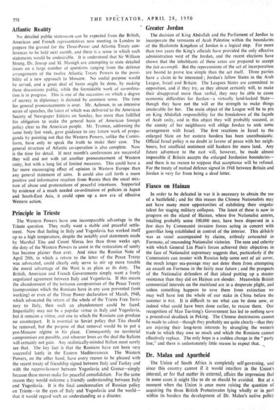Principle in Trieste
The Western Powers have one incomparable advantage in the Trieste question. They really want a stable and peaceful settle- ment. Now that feeling in Italy and Yugoslavia has worked itself up to a high temperature, despite the notably cool statements made by Marshal Tito and Count Sforza less than three weeks ago, the duty of the Western Powers to assist in the restoration of sanity has become plainer than ever. And since the Russian Note of April 20th, in which a return to the letter of the Peace Treaty was advocated, could clearly only serve to stir up more trouble the moral advantage of the West is as plain as its duty. The British, American and French Governments simply want a freely negotiated agreement between Italy and Yugoslavia. If this means the abandonment of the tortuous compromises of the Peace Treaty (compromises which the Russians have in any case prevented from working) or even of the Three Power declaration of March, 1948, which advocated the return of the whole of the Trieste Free Terri- tory to Italy, then such an abandonment could be faced. Impartiality may not be a popular virtue in Italy and Yugoslavia, but it remains a virtue, and one to which the Russians can produce no counterpart. It is essential to Soviet policy that Tito should be removed, but the purpose of that removal would be to put a pro-Moscow regime in his place. Consequently no territorial compromises are possible, and whoever loses on the deal the Italians will certainly not gain. Any realistically-minded Italian must surely see that. The key fact is that the Russians have not been very successful lately in the Eastern Mediterranean. The Western Powers, on the other hand, have every reason to be pleased with the recent treaty of friendship signed between Italy and Turkey and with the rapprochement between Yugoslavia and Greece—simply because these moves make for peaceful consolidation. For the same reason they would welcome a friendly understanding between Italy and Yugoslavia. It is the final condemnation of Russian policy on Trieste—in the eyes of Italy and Yugoslavia and the world— that it would regard such an understanding as a disaster.










































 Previous page
Previous page